(期末考点培优)专题07 句型转换(含答案解析)-2024-2025学年七年级英语下册期末复习考点培优专项冀教版(2024)
文档属性
| 名称 | (期末考点培优)专题07 句型转换(含答案解析)-2024-2025学年七年级英语下册期末复习考点培优专项冀教版(2024) | 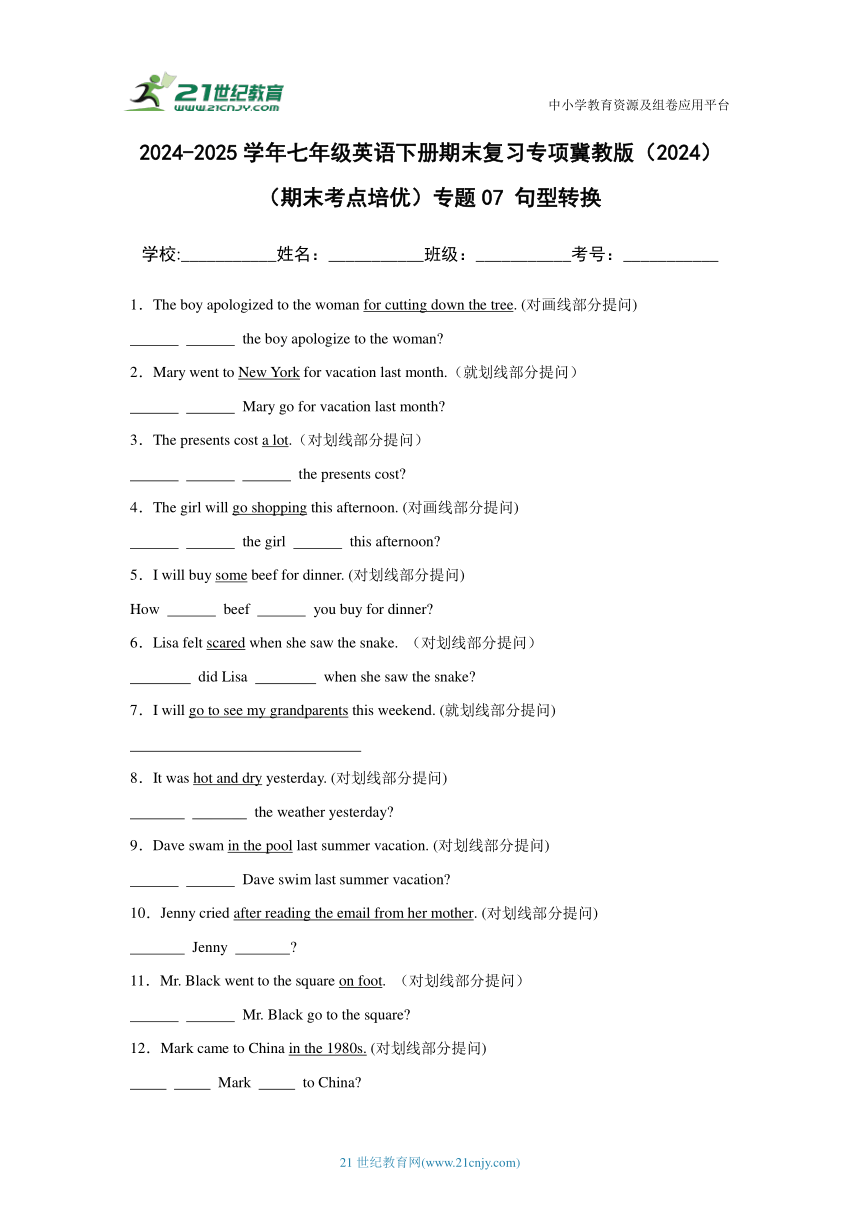 | |
| 格式 | docx | ||
| 文件大小 | 61.7KB | ||
| 资源类型 | 试卷 | ||
| 版本资源 | 冀教版 | ||
| 科目 | 英语 | ||
| 更新时间 | 2025-05-29 13:21:25 | ||
图片预览

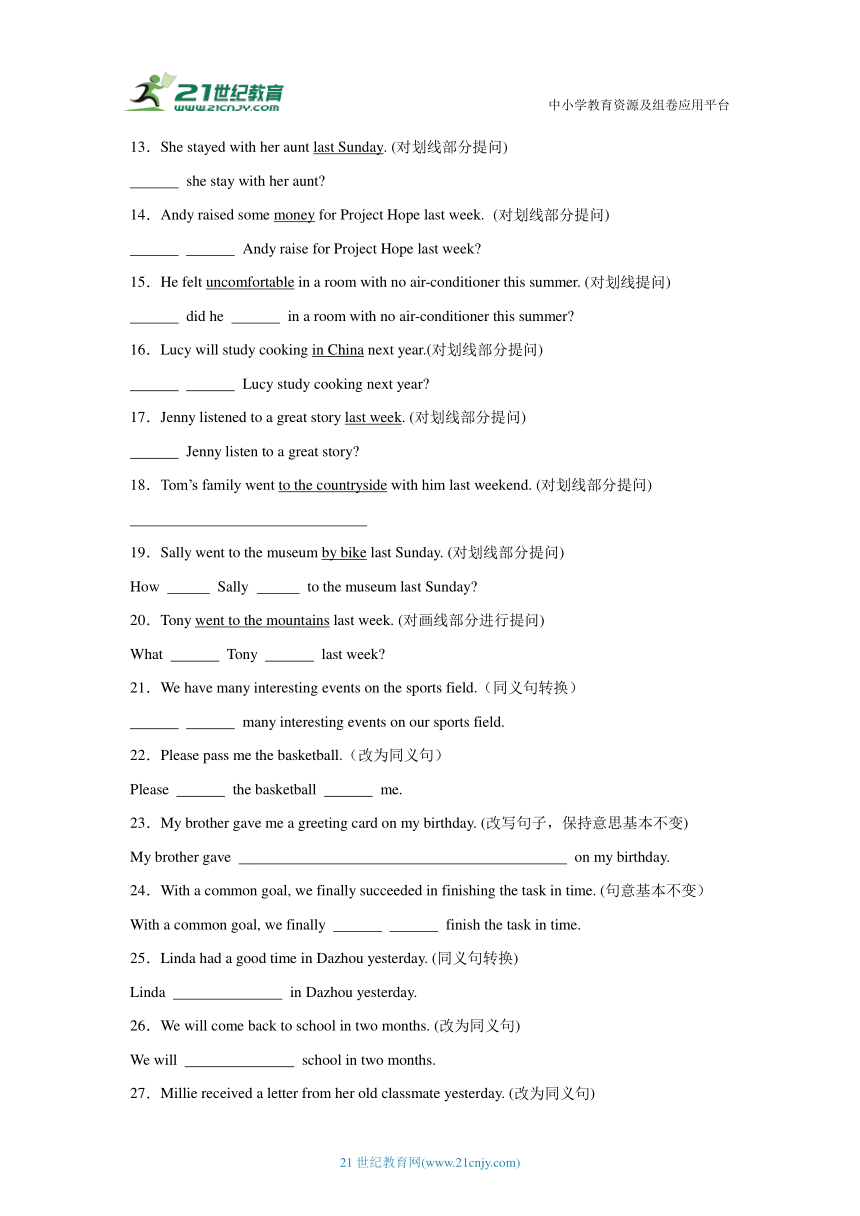
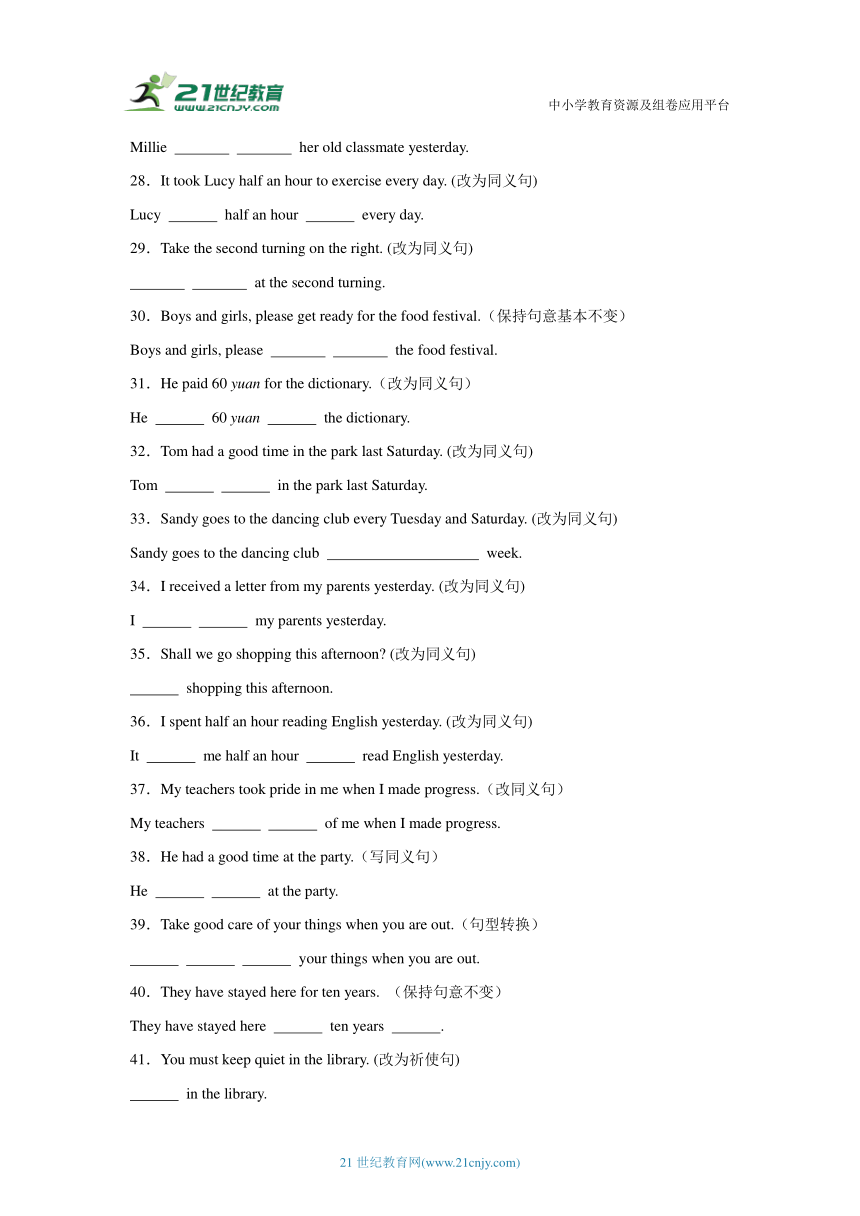
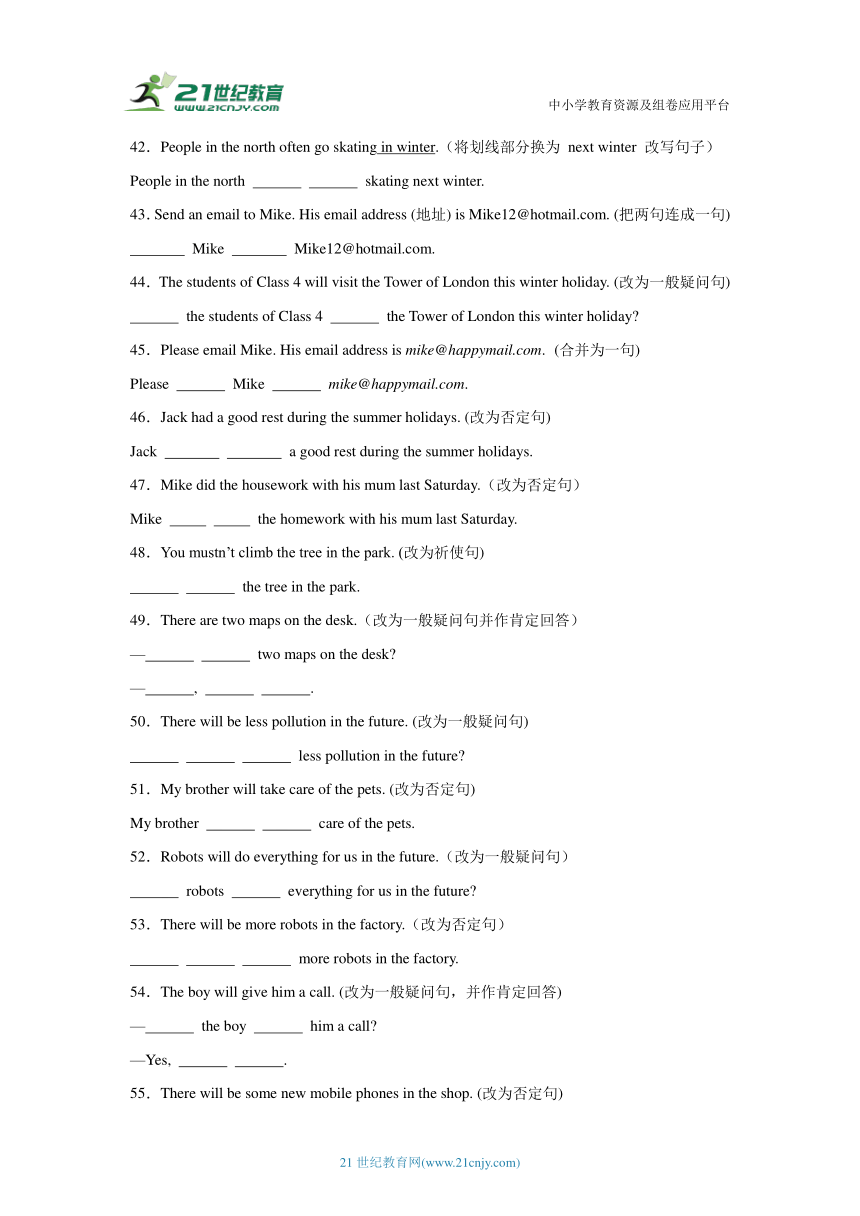
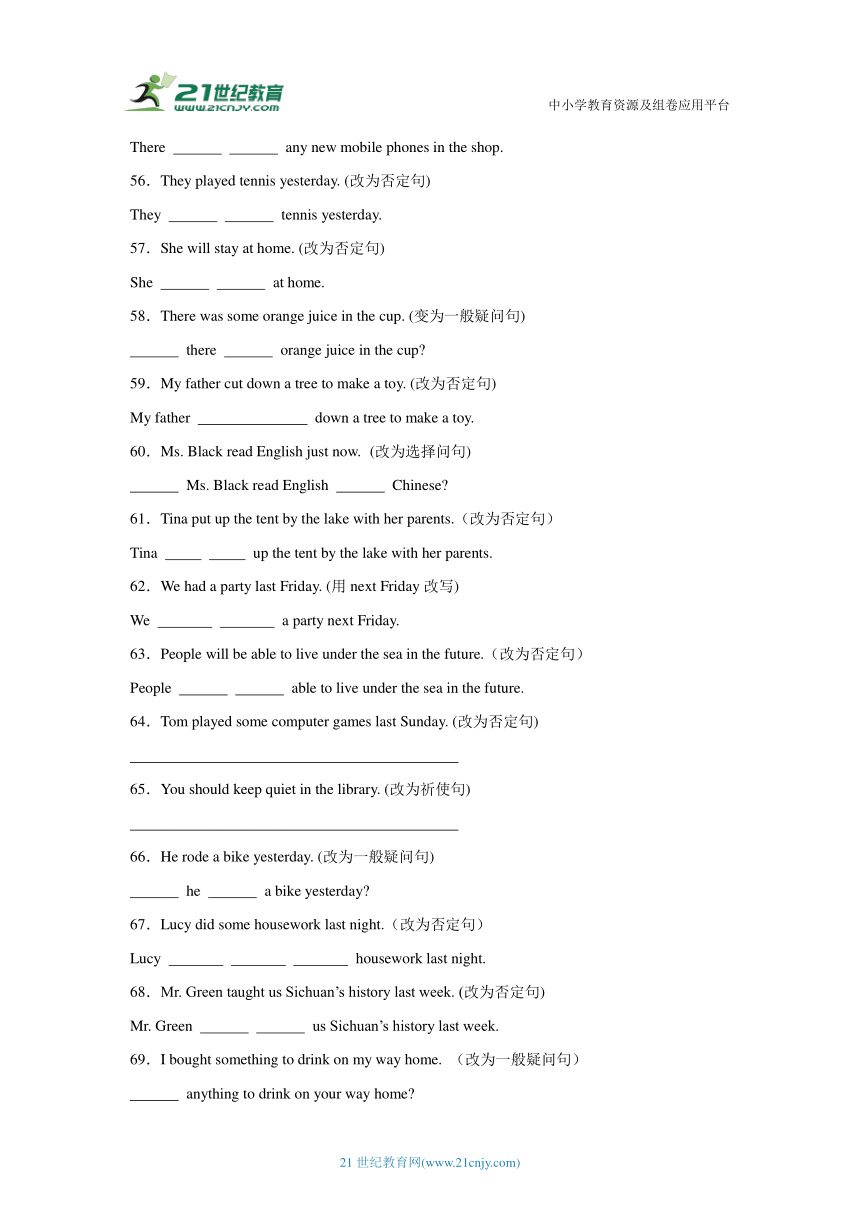
文档简介
中小学教育资源及组卷应用平台
中小学教育资源及组卷应用平台
2024-2025学年七年级英语下册期末复习专项冀教版(2024)
(期末考点培优)专题07 句型转换
学校:___________姓名:___________班级:___________考号:___________
1.The boy apologized to the woman for cutting down the tree. (对画线部分提问)
the boy apologize to the woman
2.Mary went to New York for vacation last month.(就划线部分提问)
Mary go for vacation last month
3.The presents cost a lot.(对划线部分提问)
the presents cost
4.The girl will go shopping this afternoon. (对画线部分提问)
the girl this afternoon
5.I will buy some beef for dinner. (对划线部分提问)
How beef you buy for dinner
6.Lisa felt scared when she saw the snake. (对划线部分提问)
did Lisa when she saw the snake
7.I will go to see my grandparents this weekend. (就划线部分提问)
8.It was hot and dry yesterday. (对划线部分提问)
the weather yesterday
9.Dave swam in the pool last summer vacation. (对划线部分提问)
Dave swim last summer vacation
10.Jenny cried after reading the email from her mother. (对划线部分提问)
Jenny
11.Mr. Black went to the square on foot. (对划线部分提问)
Mr. Black go to the square
12.Mark came to China in the 1980s. (对划线部分提问)
Mark to China
13.She stayed with her aunt last Sunday. (对划线部分提问)
she stay with her aunt
14.Andy raised some money for Project Hope last week. (对划线部分提问)
Andy raise for Project Hope last week
15.He felt uncomfortable in a room with no air-conditioner this summer. (对划线提问)
did he in a room with no air-conditioner this summer
16.Lucy will study cooking in China next year.(对划线部分提问)
Lucy study cooking next year
17.Jenny listened to a great story last week. (对划线部分提问)
Jenny listen to a great story
18.Tom’s family went to the countryside with him last weekend. (对划线部分提问)
19.Sally went to the museum by bike last Sunday. (对划线部分提问)
How Sally to the museum last Sunday
20.Tony went to the mountains last week. (对画线部分进行提问)
What Tony last week
21.We have many interesting events on the sports field.(同义句转换)
many interesting events on our sports field.
22.Please pass me the basketball.(改为同义句)
Please the basketball me.
23.My brother gave me a greeting card on my birthday. (改写句子,保持意思基本不变)
My brother gave on my birthday.
24.With a common goal, we finally succeeded in finishing the task in time. (句意基本不变)
With a common goal, we finally finish the task in time.
25.Linda had a good time in Dazhou yesterday. (同义句转换)
Linda in Dazhou yesterday.
26.We will come back to school in two months. (改为同义句)
We will school in two months.
27.Millie received a letter from her old classmate yesterday. (改为同义句)
Millie her old classmate yesterday.
28.It took Lucy half an hour to exercise every day. (改为同义句)
Lucy half an hour every day.
29.Take the second turning on the right. (改为同义句)
at the second turning.
30.Boys and girls, please get ready for the food festival.(保持句意基本不变)
Boys and girls, please the food festival.
31.He paid 60 yuan for the dictionary.(改为同义句)
He 60 yuan the dictionary.
32.Tom had a good time in the park last Saturday. (改为同义句)
Tom in the park last Saturday.
33.Sandy goes to the dancing club every Tuesday and Saturday. (改为同义句)
Sandy goes to the dancing club week.
34.I received a letter from my parents yesterday. (改为同义句)
I my parents yesterday.
35.Shall we go shopping this afternoon (改为同义句)
shopping this afternoon.
36.I spent half an hour reading English yesterday. (改为同义句)
It me half an hour read English yesterday.
37.My teachers took pride in me when I made progress.(改同义句)
My teachers of me when I made progress.
38.He had a good time at the party.(写同义句)
He at the party.
39.Take good care of your things when you are out.(句型转换)
your things when you are out.
40.They have stayed here for ten years. (保持句意不变)
They have stayed here ten years .
41.You must keep quiet in the library. (改为祈使句)
in the library.
42.People in the north often go skating in winter.(将划线部分换为 next winter 改写句子)
People in the north skating next winter.
43.Send an email to Mike. His email address (地址) is Mike12@. (把两句连成一句)
Mike Mike12@.
44.The students of Class 4 will visit the Tower of London this winter holiday. (改为一般疑问句)
the students of Class 4 the Tower of London this winter holiday
45.Please email Mike. His email address is mike@. (合并为一句)
Please Mike mike@.
46.Jack had a good rest during the summer holidays. (改为否定句)
Jack a good rest during the summer holidays.
47.Mike did the housework with his mum last Saturday.(改为否定句)
Mike the homework with his mum last Saturday.
48.You mustn’t climb the tree in the park. (改为祈使句)
the tree in the park.
49.There are two maps on the desk.(改为一般疑问句并作肯定回答)
— two maps on the desk
— , .
50.There will be less pollution in the future. (改为一般疑问句)
less pollution in the future
51.My brother will take care of the pets. (改为否定句)
My brother care of the pets.
52.Robots will do everything for us in the future.(改为一般疑问句)
robots everything for us in the future
53.There will be more robots in the factory.(改为否定句)
more robots in the factory.
54.The boy will give him a call. (改为一般疑问句,并作肯定回答)
— the boy him a call
—Yes, .
55.There will be some new mobile phones in the shop. (改为否定句)
There any new mobile phones in the shop.
56.They played tennis yesterday. (改为否定句)
They tennis yesterday.
57.She will stay at home. (改为否定句)
She at home.
58.There was some orange juice in the cup. (变为一般疑问句)
there orange juice in the cup
59.My father cut down a tree to make a toy. (改为否定句)
My father down a tree to make a toy.
60.Ms. Black read English just now. (改为选择问句)
Ms. Black read English Chinese
61.Tina put up the tent by the lake with her parents.(改为否定句)
Tina up the tent by the lake with her parents.
62.We had a party last Friday. (用next Friday改写)
We a party next Friday.
63.People will be able to live under the sea in the future.(改为否定句)
People able to live under the sea in the future.
64.Tom played some computer games last Sunday. (改为否定句)
65.You should keep quiet in the library. (改为祈使句)
66.He rode a bike yesterday. (改为一般疑问句)
he a bike yesterday
67.Lucy did some housework last night.(改为否定句)
Lucy housework last night.
68.Mr. Green taught us Sichuan’s history last week. (改为否定句)
Mr. Green us Sichuan’s history last week.
69.I bought something to drink on my way home. (改为一般疑问句)
anything to drink on your way home
70.If you don’t hurry, you’ll be late for the meeting. (改为祈使句)
, or you’ll be late for the meeting.
71.Things will be different in the future. (变为一般疑问句)
things in the future
72.I fed the chickens with my grandfather last week. (改为一般疑问句)
you the chickens with your grandfather last week
73.My grandmother grew some vegetables in the garden last year. (改为否定句)
My grandmother any vegetables in the garden last year.
74.Henry bought some presents in the gift shop yesterday. (改为一般疑问句)
Henry any presents in the gift shop yesterday
75.He found some milk in the fridge. (改为否定句)
He any milk in the fridge.
76.You shouldn’t be so rude to tourists. (改为祈使句)
so rude to tourists.
77.They went camping in a small village. (变为一般疑问句)
they camping in a small village
78.He bought some gifts for his parents. (变成否定句)
He any gifts for his parents.
79.You can’t play basketball in the classroom. (改成祈使句)
basketball in the classroom.
80.The girl stopped and waited at the crossing. (改为否定句)
The girl and wait at the crossing.
中小学教育资源及组卷应用平台
中小学教育资源及组卷应用平台
21世纪教育网(www.21cnjy.com)
21世纪教育网(www.21cnjy.com)
参考答案及试题解析
1.Why did
【解析】句意:男孩因砍倒那棵树而向女人道歉。根据句意,划线部分意思是“为了砍倒那棵树”,所以是对原因提问,疑问句用why提问,并且句首字母W需要大写;根据“apologized”可知,时态为一般过去时,所以疑问词后加助动词did,谓语动词用原形。故填Why;did。
2.Where did
【解析】句意:玛丽上个月去纽约度假了。对New York提问,是对地点提问,用疑问词where,根据went可知,此处用一般过去时,疑问词后面用助动词did,后面谓语用动原形go,故填Where;did。
3.How much did
【解析】句意:这些礼物花了很多钱。划线部分是花费的钱,疑问词用how much;根据语境可知,句子用一般过去时,变疑问句时借助助动词did。故填How;much;did。
4.What will do
【解析】句意:这个女孩今天下午要去购物。画线部分是将要去做的事情,用what来提问,句子是一般将来时,需借助助动词will构成疑问句,后接动词原形do,句首单词首字母大写。故填What;will;do。
5.much will
【解析】句意:我要买些牛肉当晚餐。划线部分some表示“一些”,且“beef牛肉”为不可数名词,对不可数名词数量提问应用疑问词“How much”引导特殊疑问句,后接一般疑问句语序。把will提到主语前,故填much;will。
6.How feel
【解析】句意:丽莎感到害怕当她看见蛇的时候。原句划线部分scared“害怕的”属于精神状况,提问常用疑问词How。再把剩余部分变为一般疑问句,原句为一般过去时,需借助助动词did,原felt恢复原形。故填:How;feel。
7.What will you do this weekend
【解析】句意:这个周末我要去看我的祖父母。划线部分是动作,应用what提问;原句是一般将来时:will do,变为疑问句,需要把will放到疑问词后,主语之前;疑问句中需要把第一人称I变为第二人称you。划线部分动作用动词原形do替换。故填What will you do this weekend
8.How was
【解析】句意:昨天天气又热又干。对天气提问有两种方式:What’s the weather like 或者How is the weather 结合设空及句子是一般过去时可知,应用How was。故填How;was。
9.Where did
【解析】句意:戴夫去年暑假在游泳池里游泳。划线部分表示地点,用where提问,时态是一般过去时,把助动词did放到主语前,故填Where;did。
10.When did cry
【解析】句意:珍妮读了母亲的邮件后哭了。划线部分是珍妮哭泣的时间,应用when提问;原句是一般过去时,疑问句用助动词did,后跟动词原形cry。故填When did;cry。
11.How did
【解析】句意:布莱克先生步行去了广场。根据划线部分是on foot可知, 此处对方式提问,用疑问词how来提问;根据谓语动词是went可知,句子的时态为一般过去时,要求助助动词did来构成特殊疑问句。故填How;did。
12.When did come
【解析】句意:马克20世纪80年代来中国。划线部分in the 1980s属于时间,提问常用疑问词when;句子剩余部分要变为一般疑问句,原句为一般过去时态,此处需用助动词did,动词came要变回原形come。 故填When;did;come。
13.When did
【解析】句意:上星期天她和她姑妈待在一起。原句划线部分last Sunday属于时间,提问常用疑问词When。再把剩余部分变为一般疑问句,原句为一般过去时,需借助动词did。故填When did。
14.What did
【解析】句意:安迪上周为希望工程筹集了一些资金。原句划线部分“money”属于事物,提问用疑问词what;再把剩余部分变为一般疑问句,原句为一般过去时,需借助动词did。故填What;did。
15.How feel
【解析】句意:今年夏天,他在一个没有空调的房间里感到很不舒服。划线部分uncomfortable是形容词,对形容词进行提问,应用疑问副词how;本句使用了一般过去时,提问时使用助动词did帮助构成疑问句,句子谓语动词使用动词原形feel。故意填How;feel。
16.Where will
【解析】句意:露西明年将在中国学习烹饪。划线部分in China是地点,对地点提问要用where;根据will可知是一般将来时,变特殊疑问句时要将will提到主语Lucy前,故填Where;will。
17.When did
【解析】句意:珍妮上周听了一个很棒的故事。划线部分last week是时间状语,应用疑问词when提问,句首首字母w要大写,原句是一般过去时,且含有实义动词listened,所以疑问词后应用助动词did。故填When did。
18.Where did Tom’s family go with him last weekend
【解析】句意:汤姆的家人上周末和他一起去农村了。划线部分in the countryside(在农村)是地点状语,用特殊疑问词where提问,句首首字母w应大写,由此可知,本句是特殊疑问词where引导的特殊疑问句;其结构为:特殊疑问词Where+一般疑问句。另外,原句的时态为一般过去时,所以一般疑问句的助动词为did,且动词went是过去式,需还原为动词原形go。故填Where did Tom’s family go with him last weekend
19.did go
【解析】句意:Sally上星期天骑自行车去了博物馆。由“last Sunday”可知,时态为一般过去时,助动词应用did,放在主语前;went用原形go。故填did;go。
20.did do
【解析】句意:托尼上周去爬山了。由“last week”可知,时态为一般过去时;划线部分为具体行为动作,提问时用特殊疑问词“what”;what后需接助动词do,由于是一般过去时,do要改成did; do“做”,放在助动词后用原形。故填did;do。
21.There are
【解析】句意:我们在运动场上有许多有趣的活动。there be“有”,句首首字母大写,句子的时态为一般现在时,主语为“many interesting events”,be动词用are。故填There;are。
22.pass to
【解析】句意:请把篮球递给我。pass sb. sth.相当于pass sth. to sb.,都表示“把某物递给某人”。故填pass;to。
23.a greeting card to me
【解析】句意:我哥哥在我生日那天给了我一张贺卡。动词短语give sb. sth.与give sth. to sb.意思相同,意为“给某人某物”,故填a greeting card to me。
24.managed to
【解析】句意:有了共同的目标,我们终于按时完成了任务。表示“设法完成了某事”可用结构manage to do sth.,句子用一般过去时,动词用过去式。故填managed;to。
25.had fun/enjoyed herself
【解析】句意:琳达昨天在达州玩得很开心。have a good time “玩得愉快”=have fun=enjoy oneself,主语Linda是女性,反身代词用herself,根据had可知,改写后的句子也用一般过去时,动词用过去式,故填had fun/enjoyed herself。
26.return to
【解析】句意:我们将在两个月后回到学校。“返回,回到”的表达有两种方式:come back或者return to,二者可以互换。空前有will,后接动词原形。故填return to。
27.heard from
【解析】句意:米莉昨天收到了她的老同学的一封信。根据题意可知,此处可以表达为“收到……的来信”,收到……的来信:hear from,事情发生在过去,因此此处用动词过去式heard。故填heard;from。
28.spent exercising
【解析】句意:Lucy每天花半个小时锻炼身体。it took sb some time to do sth表示“做某事花费某人多长时间”,它的同义结构为sb spent time doing sth。原句是一般过去时,此处动词也用过去式,故填spent;exercising。
29.Turn right
【解析】句意:在第二个路口向右拐。此处同义转换可以用Turn right“向右转”,祈使句,动词用原形。 故填Turn;right
30.prepare for
【解析】句意:同学们,请为美食节做好准备。get ready for=prepare for“为……做好准备”,句子是祈使句,此处动词用原形,故填prepare;for。
31.spent on
【解析】句意:他花了60元买这本字典。原句用“主语+ pay +金钱+ for sth.”句型表示“某人花钱买某物”之意,此处可以同义转换为“主语+ spend +金钱+ on sth.”句型。时态均为一般过去时态,故动词spend应用过去式。故填spent;on。
32.enjoyed/had himself/fun
【解析】句意:上星期六汤姆在公园里玩得很开心。have a good time=enjoy oneself=have fun“玩得开心”。原句中had为过去式,空一也需要改为过去式;空二反身代词oneself指代Tom,要用himself。故填enjoyed/had;himself/fun。
33.twice a
【解析】句意:Sandy每周二和周六都去舞蹈俱乐部。根据“every Tuesday and Saturday”可知,每周二和周五去,说明一周两次,应用表示频度的副词词组twice a week来表示。故填twice;a。
34.heard from
【解析】句意:昨天我收到父母的一封信。receive a letter from sb.=hear from sb.“收到某人的来信”,句子为一般过去时,所以谓语动词应用hear的过去式heard。故填heard;from。
35.Let’s go
【解析】句意:我们今天下午去购物好吗?根据“...shopping this afternoon.”可知,本句需转换成表示建议的陈述句句式,let’s do sth.“让我们做某事吧”,let’s位于句首字母l大写,动词go应用原形。故填Let’s go。
36.took to
【解析】句意:我昨天花半小时读英语。根据题干可知,sb spend some time doing sth“某人做某事花费多长时间” ,它的同义结构是It takes sb some time to do sth.,根据时间状语yesterday可知,句子要用一般过去时。故填took;to。
37.were proud
【解析】句意:当我取得进步的时候我的老师为我感到自豪。此处改为同义句,根据所给英文单词可知,此处是动词短语的同义转化为形容词短语:take pride in=be proud of“为……感到自豪”,且原句为一般过去时,第一空也应用过去式was/were,表示一般过去时,主语为My teachers,be动词用were。故填were;proud。
38.enjoyed himself
【解析】句意:他在聚会上玩得很开心。have a good time=enjoy oneself“玩得开心”,主语是He,此处应用反身代词himself。结合“had”可知,时态是一般过去时,enjoy用其过去式。故填enjoyed;himself。
39.Look after well
【解析】句意:外出时要保管好自己的东西。take good care of=look after well“好好照顾”,此句是祈使句的肯定形式,第一空应填动词原形,故填Look;after;well。
40.since ago
【解析】句意:他们已经在这十年了。根据原句句意以及“They have stayed here”的完成时可知,此处还可以用“since”,译为“从十年前就在这了”;而since引导的时间状语需用具有过去时特点的副词,因此根据所给的信息可知填ago。故填since;ago。
41.Keep quiet
【解析】句意:在图书馆你必须保持安静。原句为肯定句,变为祈使句肯定形式时,以动词原形开头,keep quiet“保持安静”,句首单词首字母需要大写,故填Keep quiet。
42.will go
【解析】句意:北方人经常在冬天去滑冰。next winter表示“下一个冬天”,所以句子应用一般将来时:will do。故填will;go。
43.Email at
【解析】句意:给迈克发封电子邮件。他的电子邮件地址是Mike12@。email sb. at...“给某人发电子邮件到……”,为固定短语;此句为祈使句,应用动词原形开头。故填Email;at。
44.Will visit
【解析】句意:四班的学生将会在今年寒假参观伦敦塔。本题考查的是一般疑问句。原句中有助动词will,所以改成一般疑问句时,将will提前,填入第一个空,并且首字母大写;助动词后动词用原形,所以第二个空填visit。故填Will;visit。
45.email at
【解析】句意:请给迈克发邮件。他的电子邮件地址是mike@。合并为一句是 “请给迈克发邮件至mike@”,用email sb at+电子邮件,表示“给某人发邮件到……”。本句是祈使句,所以用动词原形开头,故填email;at。
46.didn’t have
【解析】句意:Jack在暑假期间好好休息了一下。根据“had”可知,此句为一般过去时态。含有实义动词,否定句用助动词didn’t,谓语动词用原形have。故填didn’t;have。
47.didn’t do
【解析】句意:上周六,迈克和妈妈一起做了家务。根据题干可知,本题是一般过去时。did是do的过去式,是实义动词,意思是“做,干”,故改为否定句时需要借助助动词didn’t,且助动词didn’t需要位于主语Mike的后面。助动词didn’t的后面需要加动词原形do。故填didn’t;do。
48.Don’t climb
【解析】句意:你不能在公园里爬树。改为祈使句时,原句是否定句,应以don’t开头,后接动词原形climb,句首字母要大写。故填Don’t;climb。
49.Are there Yes there are
【解析】句意:桌子上有两张地图。本题考查there be句型变为一般疑问句及其否定回答。原句是陈述句,动词是are,因此变为一般疑问句时把are提至句首,首字母大写。肯定回答用Yes, there are。故填Are;there;Yes;there;are。
50.Will there be
【解析】句意:将来会有更少的污染。该句是there be句型,且是一般将来时,改为一般疑问句,结构应该为“Will there be”。故填Will;there;be。
51.won’t take
【解析】句意:我哥哥将照顾宠物。原句是含有动词“take care of”的句子,且该句是一般将来时,其否定句需在will后接not,动词填原形。故填won’t;take。
52.Will do
【解析】句意:未来机器人会为我们做一切事情。改为一般疑问句时,将助动词will提到句首,并大写首字母,后接动词原形,故填Will;do。
53.There won’t be
【解析】句意:工厂里会有更多的机器人。句子是there be结构的将来时,变为否定句时,在will后加not,缩写为won’t,其他不变。故填There;won’t;be。
54.Will give he will
【解析】句意:男孩会给他打电话。原句时态为一般将来时,改为一般疑问句,应将will提至主语“the boy”前,其后部分保持不变;一般疑问句是以“Will the boy”开头,此处作肯定回答,其结构为“Yes, 主语+will”,主语应用he,指代“the boy”。故填Will;give;he;will。
55.won’t be
【解析】句意:商店里会有一些新手机。句子是there will be结构,否定句需在will后加not,缩写为won’t,后跟be的原形。故填won’t;be。
56.didn’t play
【解析】句意:他们昨天打网球了。原句时态为一般过去时,played是一个实义动词,改为否定句,应借助否定助动词didn’t,其后接动词原形。故填didn’t;play。
57.won’t stay
【解析】句意:她将待在家里。原句含有助动词will,变否定直接在后面加not,缩写为won’t,后跟动词原形stay。故填won’t;stay。
58.Was any
【解析】句意:杯子里有一些橙汁。该句是there be句型,改为一般疑问句,需将原句中的be动词was提前,some改为any。故填Was;any。
59.didn’t cut
【解析】句意:我爸爸砍下一棵树来做玩具。根据“cut”可知句子采用一般过去时,改为否定句时应借助助动词did,后加not缩写成didn’t,后加动词原形cut。故填didn’t cut。
60.Did or
【解析】句意:布莱克女士刚才在读英语。改为选择问句翻译为 “布莱克女士读的是英文还是中文?”,原句时态是一般过去时,助动词用Did,选择疑问句用or连接。故填Did;or。
61.didn’t put
【解析】句意:蒂娜和父母在湖边搭起了帐篷。原句中的put为实义动词put的过去式,改为否定句时,应借助助动词did加not缩写成didn’t,后加动词原形put。故填didn’t;put。
62.will have
【解析】句意:上周五我们举办了一场派对。要求用next Friday改写,故时态为一般将来时,其结构是will+动词原形。故填will;have。
63.won’t be
【解析】句意:将来人们将能够生活在海底。句子是一般将来时,改为否定句时,在will后加not,缩写为won’t,其他不变。故填won’t;be。
64.Tom didn’t play any computer games last Sunday.
【解析】句意:汤姆上星期天玩了一些电脑游戏。原句时态为一般过去时,且含有实义动词played,故变否定句要用助动词didn’t,后接动词原形play;原句的some改为any。故填Tom didn’t play any computer games last Sunday.
65.Keep quiet in the library.
【解析】句意:你应该在图书馆保持安静。原句是肯定句,keep是系动词,含有系动词的祈使句肯定形式的结构是:系动词+表语+其他。 故填Keep quiet in the library.
66.Did ride
【解析】句意:他昨天骑自行车了。原句是一般过去时,其一般疑问句需在句前加助动词did,动词过去式rode还原成原形ride。故填Did;ride。
67.didn’t do any
【解析】句意:露西昨晚做了一些家务。题干中句子是带有实义动词的一般过去时,变否定句时在主语和谓语动词之间加助动词didn’t,句中实义动词did变回原形do,some一般用在肯定句中,否定句中需变成any,故填didn’t;do;any。
68.didn’t teach
【解析】句意:格林先生上周教我们四川历史。原句时态是一般过去时,句中的taught是实义动词,变否定句用助动词didn’t+动词原形,taught的原形为teach。故填didn’t;teach。
69.Did you buy
【解析】句意:我在回家的路上买了点喝的。根据“bought”可知句子是一般过去时,变疑问句时借助助动词did,放主语I之前,后加动词原形。故填Did you buy。
70.Hurry up
【解析】句意:如果你不抓紧时间,开会就要迟到了。即“祈使句+or+简单句”结构,此处意为“快点,否则你开会要迟到了。”。祈使句是以动词原形开头。故填Hurry;up。
71.Will be different
【解析】句意:未来的情况会有所不同。肯定句为一般将来时,结构为will be, 因此变为一般疑问句时,应把will提前放句首,并大写首字母,形容词different前应为动词原形be。故填Will;be;different。
72.Did feed
【解析】句意:上周我和爷爷一起喂鸡。 根据“last week”可知,此句时态为一般过去时态;fed是feed的过去式,是实义动词,因此将原句改为一般疑问句时,需要在句首加助动词Did,后面跟fed的动词原形feed。故填Did;feed。
73.didn’t grow
【解析】句意:去年我奶奶在花园里种了一些蔬菜。原句是一般过去时,谓语动词是过去式grew,改为否定句时,要加助动词didn’t,后接动词原形grow。故填didn’t grow。
74.Did buy
【解析】句意:亨利昨天在礼品店买了一些礼物。原句中的动词“bought”是动词过去式,改成一般疑问句时,用助动词did+动词原形。故填Did;buy。
75.didn’t find
【解析】句意:他在冰箱里发现了一些牛奶。原句的时态是一般过去时,谓语动词found是find的过去式,因此改成否定句要借助于助动词didn’t,后面接动词原形,因此空格处填didn’t;find。故填didn’t;find。
76.Don’t be
【解析】句意:你不应该对游客如此粗鲁。祈使句以动词原形开头,“rude”是形容词,前面加上be动词原形。另外,句子要表达否定意思,所以句前需加“Don’t”。故填Don’t;be。
77.Did go
【解析】句意:他们在一个小村庄里露营。分析题干可知,原句为一般过去时,且谓语动词是实义动词went,变为一般疑问句时要借助助动词did,位于句首,首字母要大写,后接动词原形go。故填Did;go。
78.didn’t buy
【解析】句意:他给父母买了一些礼物。原句谓语动词是过去式bought,否定句用助动词didn’t+动词原形。故填didn’t buy。
79.Don’t play
【解析】句意:你不能在教室里打篮球。否定祈使句的词构成为:Don’t+动词原形+其它,所以此处应为Don’t play...,故填Don’t;play。
80.didn’t stop
【解析】句意:女孩在十字路口停下来等着。根据“stopped and waited”可知,句子含有实义动词,且时态是一般过去时,否定句需借助助动词didn’t,后面的实义动词用原形。故填didn’t;stop。
21世纪教育网(www.21cnjy.com)
21世纪教育网(www.21cnjy.com)
中小学教育资源及组卷应用平台
2024-2025学年七年级英语下册期末复习专项冀教版(2024)
(期末考点培优)专题07 句型转换
学校:___________姓名:___________班级:___________考号:___________
1.The boy apologized to the woman for cutting down the tree. (对画线部分提问)
the boy apologize to the woman
2.Mary went to New York for vacation last month.(就划线部分提问)
Mary go for vacation last month
3.The presents cost a lot.(对划线部分提问)
the presents cost
4.The girl will go shopping this afternoon. (对画线部分提问)
the girl this afternoon
5.I will buy some beef for dinner. (对划线部分提问)
How beef you buy for dinner
6.Lisa felt scared when she saw the snake. (对划线部分提问)
did Lisa when she saw the snake
7.I will go to see my grandparents this weekend. (就划线部分提问)
8.It was hot and dry yesterday. (对划线部分提问)
the weather yesterday
9.Dave swam in the pool last summer vacation. (对划线部分提问)
Dave swim last summer vacation
10.Jenny cried after reading the email from her mother. (对划线部分提问)
Jenny
11.Mr. Black went to the square on foot. (对划线部分提问)
Mr. Black go to the square
12.Mark came to China in the 1980s. (对划线部分提问)
Mark to China
13.She stayed with her aunt last Sunday. (对划线部分提问)
she stay with her aunt
14.Andy raised some money for Project Hope last week. (对划线部分提问)
Andy raise for Project Hope last week
15.He felt uncomfortable in a room with no air-conditioner this summer. (对划线提问)
did he in a room with no air-conditioner this summer
16.Lucy will study cooking in China next year.(对划线部分提问)
Lucy study cooking next year
17.Jenny listened to a great story last week. (对划线部分提问)
Jenny listen to a great story
18.Tom’s family went to the countryside with him last weekend. (对划线部分提问)
19.Sally went to the museum by bike last Sunday. (对划线部分提问)
How Sally to the museum last Sunday
20.Tony went to the mountains last week. (对画线部分进行提问)
What Tony last week
21.We have many interesting events on the sports field.(同义句转换)
many interesting events on our sports field.
22.Please pass me the basketball.(改为同义句)
Please the basketball me.
23.My brother gave me a greeting card on my birthday. (改写句子,保持意思基本不变)
My brother gave on my birthday.
24.With a common goal, we finally succeeded in finishing the task in time. (句意基本不变)
With a common goal, we finally finish the task in time.
25.Linda had a good time in Dazhou yesterday. (同义句转换)
Linda in Dazhou yesterday.
26.We will come back to school in two months. (改为同义句)
We will school in two months.
27.Millie received a letter from her old classmate yesterday. (改为同义句)
Millie her old classmate yesterday.
28.It took Lucy half an hour to exercise every day. (改为同义句)
Lucy half an hour every day.
29.Take the second turning on the right. (改为同义句)
at the second turning.
30.Boys and girls, please get ready for the food festival.(保持句意基本不变)
Boys and girls, please the food festival.
31.He paid 60 yuan for the dictionary.(改为同义句)
He 60 yuan the dictionary.
32.Tom had a good time in the park last Saturday. (改为同义句)
Tom in the park last Saturday.
33.Sandy goes to the dancing club every Tuesday and Saturday. (改为同义句)
Sandy goes to the dancing club week.
34.I received a letter from my parents yesterday. (改为同义句)
I my parents yesterday.
35.Shall we go shopping this afternoon (改为同义句)
shopping this afternoon.
36.I spent half an hour reading English yesterday. (改为同义句)
It me half an hour read English yesterday.
37.My teachers took pride in me when I made progress.(改同义句)
My teachers of me when I made progress.
38.He had a good time at the party.(写同义句)
He at the party.
39.Take good care of your things when you are out.(句型转换)
your things when you are out.
40.They have stayed here for ten years. (保持句意不变)
They have stayed here ten years .
41.You must keep quiet in the library. (改为祈使句)
in the library.
42.People in the north often go skating in winter.(将划线部分换为 next winter 改写句子)
People in the north skating next winter.
43.Send an email to Mike. His email address (地址) is Mike12@. (把两句连成一句)
Mike Mike12@.
44.The students of Class 4 will visit the Tower of London this winter holiday. (改为一般疑问句)
the students of Class 4 the Tower of London this winter holiday
45.Please email Mike. His email address is mike@. (合并为一句)
Please Mike mike@.
46.Jack had a good rest during the summer holidays. (改为否定句)
Jack a good rest during the summer holidays.
47.Mike did the housework with his mum last Saturday.(改为否定句)
Mike the homework with his mum last Saturday.
48.You mustn’t climb the tree in the park. (改为祈使句)
the tree in the park.
49.There are two maps on the desk.(改为一般疑问句并作肯定回答)
— two maps on the desk
— , .
50.There will be less pollution in the future. (改为一般疑问句)
less pollution in the future
51.My brother will take care of the pets. (改为否定句)
My brother care of the pets.
52.Robots will do everything for us in the future.(改为一般疑问句)
robots everything for us in the future
53.There will be more robots in the factory.(改为否定句)
more robots in the factory.
54.The boy will give him a call. (改为一般疑问句,并作肯定回答)
— the boy him a call
—Yes, .
55.There will be some new mobile phones in the shop. (改为否定句)
There any new mobile phones in the shop.
56.They played tennis yesterday. (改为否定句)
They tennis yesterday.
57.She will stay at home. (改为否定句)
She at home.
58.There was some orange juice in the cup. (变为一般疑问句)
there orange juice in the cup
59.My father cut down a tree to make a toy. (改为否定句)
My father down a tree to make a toy.
60.Ms. Black read English just now. (改为选择问句)
Ms. Black read English Chinese
61.Tina put up the tent by the lake with her parents.(改为否定句)
Tina up the tent by the lake with her parents.
62.We had a party last Friday. (用next Friday改写)
We a party next Friday.
63.People will be able to live under the sea in the future.(改为否定句)
People able to live under the sea in the future.
64.Tom played some computer games last Sunday. (改为否定句)
65.You should keep quiet in the library. (改为祈使句)
66.He rode a bike yesterday. (改为一般疑问句)
he a bike yesterday
67.Lucy did some housework last night.(改为否定句)
Lucy housework last night.
68.Mr. Green taught us Sichuan’s history last week. (改为否定句)
Mr. Green us Sichuan’s history last week.
69.I bought something to drink on my way home. (改为一般疑问句)
anything to drink on your way home
70.If you don’t hurry, you’ll be late for the meeting. (改为祈使句)
, or you’ll be late for the meeting.
71.Things will be different in the future. (变为一般疑问句)
things in the future
72.I fed the chickens with my grandfather last week. (改为一般疑问句)
you the chickens with your grandfather last week
73.My grandmother grew some vegetables in the garden last year. (改为否定句)
My grandmother any vegetables in the garden last year.
74.Henry bought some presents in the gift shop yesterday. (改为一般疑问句)
Henry any presents in the gift shop yesterday
75.He found some milk in the fridge. (改为否定句)
He any milk in the fridge.
76.You shouldn’t be so rude to tourists. (改为祈使句)
so rude to tourists.
77.They went camping in a small village. (变为一般疑问句)
they camping in a small village
78.He bought some gifts for his parents. (变成否定句)
He any gifts for his parents.
79.You can’t play basketball in the classroom. (改成祈使句)
basketball in the classroom.
80.The girl stopped and waited at the crossing. (改为否定句)
The girl and wait at the crossing.
中小学教育资源及组卷应用平台
中小学教育资源及组卷应用平台
21世纪教育网(www.21cnjy.com)
21世纪教育网(www.21cnjy.com)
参考答案及试题解析
1.Why did
【解析】句意:男孩因砍倒那棵树而向女人道歉。根据句意,划线部分意思是“为了砍倒那棵树”,所以是对原因提问,疑问句用why提问,并且句首字母W需要大写;根据“apologized”可知,时态为一般过去时,所以疑问词后加助动词did,谓语动词用原形。故填Why;did。
2.Where did
【解析】句意:玛丽上个月去纽约度假了。对New York提问,是对地点提问,用疑问词where,根据went可知,此处用一般过去时,疑问词后面用助动词did,后面谓语用动原形go,故填Where;did。
3.How much did
【解析】句意:这些礼物花了很多钱。划线部分是花费的钱,疑问词用how much;根据语境可知,句子用一般过去时,变疑问句时借助助动词did。故填How;much;did。
4.What will do
【解析】句意:这个女孩今天下午要去购物。画线部分是将要去做的事情,用what来提问,句子是一般将来时,需借助助动词will构成疑问句,后接动词原形do,句首单词首字母大写。故填What;will;do。
5.much will
【解析】句意:我要买些牛肉当晚餐。划线部分some表示“一些”,且“beef牛肉”为不可数名词,对不可数名词数量提问应用疑问词“How much”引导特殊疑问句,后接一般疑问句语序。把will提到主语前,故填much;will。
6.How feel
【解析】句意:丽莎感到害怕当她看见蛇的时候。原句划线部分scared“害怕的”属于精神状况,提问常用疑问词How。再把剩余部分变为一般疑问句,原句为一般过去时,需借助助动词did,原felt恢复原形。故填:How;feel。
7.What will you do this weekend
【解析】句意:这个周末我要去看我的祖父母。划线部分是动作,应用what提问;原句是一般将来时:will do,变为疑问句,需要把will放到疑问词后,主语之前;疑问句中需要把第一人称I变为第二人称you。划线部分动作用动词原形do替换。故填What will you do this weekend
8.How was
【解析】句意:昨天天气又热又干。对天气提问有两种方式:What’s the weather like 或者How is the weather 结合设空及句子是一般过去时可知,应用How was。故填How;was。
9.Where did
【解析】句意:戴夫去年暑假在游泳池里游泳。划线部分表示地点,用where提问,时态是一般过去时,把助动词did放到主语前,故填Where;did。
10.When did cry
【解析】句意:珍妮读了母亲的邮件后哭了。划线部分是珍妮哭泣的时间,应用when提问;原句是一般过去时,疑问句用助动词did,后跟动词原形cry。故填When did;cry。
11.How did
【解析】句意:布莱克先生步行去了广场。根据划线部分是on foot可知, 此处对方式提问,用疑问词how来提问;根据谓语动词是went可知,句子的时态为一般过去时,要求助助动词did来构成特殊疑问句。故填How;did。
12.When did come
【解析】句意:马克20世纪80年代来中国。划线部分in the 1980s属于时间,提问常用疑问词when;句子剩余部分要变为一般疑问句,原句为一般过去时态,此处需用助动词did,动词came要变回原形come。 故填When;did;come。
13.When did
【解析】句意:上星期天她和她姑妈待在一起。原句划线部分last Sunday属于时间,提问常用疑问词When。再把剩余部分变为一般疑问句,原句为一般过去时,需借助动词did。故填When did。
14.What did
【解析】句意:安迪上周为希望工程筹集了一些资金。原句划线部分“money”属于事物,提问用疑问词what;再把剩余部分变为一般疑问句,原句为一般过去时,需借助动词did。故填What;did。
15.How feel
【解析】句意:今年夏天,他在一个没有空调的房间里感到很不舒服。划线部分uncomfortable是形容词,对形容词进行提问,应用疑问副词how;本句使用了一般过去时,提问时使用助动词did帮助构成疑问句,句子谓语动词使用动词原形feel。故意填How;feel。
16.Where will
【解析】句意:露西明年将在中国学习烹饪。划线部分in China是地点,对地点提问要用where;根据will可知是一般将来时,变特殊疑问句时要将will提到主语Lucy前,故填Where;will。
17.When did
【解析】句意:珍妮上周听了一个很棒的故事。划线部分last week是时间状语,应用疑问词when提问,句首首字母w要大写,原句是一般过去时,且含有实义动词listened,所以疑问词后应用助动词did。故填When did。
18.Where did Tom’s family go with him last weekend
【解析】句意:汤姆的家人上周末和他一起去农村了。划线部分in the countryside(在农村)是地点状语,用特殊疑问词where提问,句首首字母w应大写,由此可知,本句是特殊疑问词where引导的特殊疑问句;其结构为:特殊疑问词Where+一般疑问句。另外,原句的时态为一般过去时,所以一般疑问句的助动词为did,且动词went是过去式,需还原为动词原形go。故填Where did Tom’s family go with him last weekend
19.did go
【解析】句意:Sally上星期天骑自行车去了博物馆。由“last Sunday”可知,时态为一般过去时,助动词应用did,放在主语前;went用原形go。故填did;go。
20.did do
【解析】句意:托尼上周去爬山了。由“last week”可知,时态为一般过去时;划线部分为具体行为动作,提问时用特殊疑问词“what”;what后需接助动词do,由于是一般过去时,do要改成did; do“做”,放在助动词后用原形。故填did;do。
21.There are
【解析】句意:我们在运动场上有许多有趣的活动。there be“有”,句首首字母大写,句子的时态为一般现在时,主语为“many interesting events”,be动词用are。故填There;are。
22.pass to
【解析】句意:请把篮球递给我。pass sb. sth.相当于pass sth. to sb.,都表示“把某物递给某人”。故填pass;to。
23.a greeting card to me
【解析】句意:我哥哥在我生日那天给了我一张贺卡。动词短语give sb. sth.与give sth. to sb.意思相同,意为“给某人某物”,故填a greeting card to me。
24.managed to
【解析】句意:有了共同的目标,我们终于按时完成了任务。表示“设法完成了某事”可用结构manage to do sth.,句子用一般过去时,动词用过去式。故填managed;to。
25.had fun/enjoyed herself
【解析】句意:琳达昨天在达州玩得很开心。have a good time “玩得愉快”=have fun=enjoy oneself,主语Linda是女性,反身代词用herself,根据had可知,改写后的句子也用一般过去时,动词用过去式,故填had fun/enjoyed herself。
26.return to
【解析】句意:我们将在两个月后回到学校。“返回,回到”的表达有两种方式:come back或者return to,二者可以互换。空前有will,后接动词原形。故填return to。
27.heard from
【解析】句意:米莉昨天收到了她的老同学的一封信。根据题意可知,此处可以表达为“收到……的来信”,收到……的来信:hear from,事情发生在过去,因此此处用动词过去式heard。故填heard;from。
28.spent exercising
【解析】句意:Lucy每天花半个小时锻炼身体。it took sb some time to do sth表示“做某事花费某人多长时间”,它的同义结构为sb spent time doing sth。原句是一般过去时,此处动词也用过去式,故填spent;exercising。
29.Turn right
【解析】句意:在第二个路口向右拐。此处同义转换可以用Turn right“向右转”,祈使句,动词用原形。 故填Turn;right
30.prepare for
【解析】句意:同学们,请为美食节做好准备。get ready for=prepare for“为……做好准备”,句子是祈使句,此处动词用原形,故填prepare;for。
31.spent on
【解析】句意:他花了60元买这本字典。原句用“主语+ pay +金钱+ for sth.”句型表示“某人花钱买某物”之意,此处可以同义转换为“主语+ spend +金钱+ on sth.”句型。时态均为一般过去时态,故动词spend应用过去式。故填spent;on。
32.enjoyed/had himself/fun
【解析】句意:上星期六汤姆在公园里玩得很开心。have a good time=enjoy oneself=have fun“玩得开心”。原句中had为过去式,空一也需要改为过去式;空二反身代词oneself指代Tom,要用himself。故填enjoyed/had;himself/fun。
33.twice a
【解析】句意:Sandy每周二和周六都去舞蹈俱乐部。根据“every Tuesday and Saturday”可知,每周二和周五去,说明一周两次,应用表示频度的副词词组twice a week来表示。故填twice;a。
34.heard from
【解析】句意:昨天我收到父母的一封信。receive a letter from sb.=hear from sb.“收到某人的来信”,句子为一般过去时,所以谓语动词应用hear的过去式heard。故填heard;from。
35.Let’s go
【解析】句意:我们今天下午去购物好吗?根据“...shopping this afternoon.”可知,本句需转换成表示建议的陈述句句式,let’s do sth.“让我们做某事吧”,let’s位于句首字母l大写,动词go应用原形。故填Let’s go。
36.took to
【解析】句意:我昨天花半小时读英语。根据题干可知,sb spend some time doing sth“某人做某事花费多长时间” ,它的同义结构是It takes sb some time to do sth.,根据时间状语yesterday可知,句子要用一般过去时。故填took;to。
37.were proud
【解析】句意:当我取得进步的时候我的老师为我感到自豪。此处改为同义句,根据所给英文单词可知,此处是动词短语的同义转化为形容词短语:take pride in=be proud of“为……感到自豪”,且原句为一般过去时,第一空也应用过去式was/were,表示一般过去时,主语为My teachers,be动词用were。故填were;proud。
38.enjoyed himself
【解析】句意:他在聚会上玩得很开心。have a good time=enjoy oneself“玩得开心”,主语是He,此处应用反身代词himself。结合“had”可知,时态是一般过去时,enjoy用其过去式。故填enjoyed;himself。
39.Look after well
【解析】句意:外出时要保管好自己的东西。take good care of=look after well“好好照顾”,此句是祈使句的肯定形式,第一空应填动词原形,故填Look;after;well。
40.since ago
【解析】句意:他们已经在这十年了。根据原句句意以及“They have stayed here”的完成时可知,此处还可以用“since”,译为“从十年前就在这了”;而since引导的时间状语需用具有过去时特点的副词,因此根据所给的信息可知填ago。故填since;ago。
41.Keep quiet
【解析】句意:在图书馆你必须保持安静。原句为肯定句,变为祈使句肯定形式时,以动词原形开头,keep quiet“保持安静”,句首单词首字母需要大写,故填Keep quiet。
42.will go
【解析】句意:北方人经常在冬天去滑冰。next winter表示“下一个冬天”,所以句子应用一般将来时:will do。故填will;go。
43.Email at
【解析】句意:给迈克发封电子邮件。他的电子邮件地址是Mike12@。email sb. at...“给某人发电子邮件到……”,为固定短语;此句为祈使句,应用动词原形开头。故填Email;at。
44.Will visit
【解析】句意:四班的学生将会在今年寒假参观伦敦塔。本题考查的是一般疑问句。原句中有助动词will,所以改成一般疑问句时,将will提前,填入第一个空,并且首字母大写;助动词后动词用原形,所以第二个空填visit。故填Will;visit。
45.email at
【解析】句意:请给迈克发邮件。他的电子邮件地址是mike@。合并为一句是 “请给迈克发邮件至mike@”,用email sb at+电子邮件,表示“给某人发邮件到……”。本句是祈使句,所以用动词原形开头,故填email;at。
46.didn’t have
【解析】句意:Jack在暑假期间好好休息了一下。根据“had”可知,此句为一般过去时态。含有实义动词,否定句用助动词didn’t,谓语动词用原形have。故填didn’t;have。
47.didn’t do
【解析】句意:上周六,迈克和妈妈一起做了家务。根据题干可知,本题是一般过去时。did是do的过去式,是实义动词,意思是“做,干”,故改为否定句时需要借助助动词didn’t,且助动词didn’t需要位于主语Mike的后面。助动词didn’t的后面需要加动词原形do。故填didn’t;do。
48.Don’t climb
【解析】句意:你不能在公园里爬树。改为祈使句时,原句是否定句,应以don’t开头,后接动词原形climb,句首字母要大写。故填Don’t;climb。
49.Are there Yes there are
【解析】句意:桌子上有两张地图。本题考查there be句型变为一般疑问句及其否定回答。原句是陈述句,动词是are,因此变为一般疑问句时把are提至句首,首字母大写。肯定回答用Yes, there are。故填Are;there;Yes;there;are。
50.Will there be
【解析】句意:将来会有更少的污染。该句是there be句型,且是一般将来时,改为一般疑问句,结构应该为“Will there be”。故填Will;there;be。
51.won’t take
【解析】句意:我哥哥将照顾宠物。原句是含有动词“take care of”的句子,且该句是一般将来时,其否定句需在will后接not,动词填原形。故填won’t;take。
52.Will do
【解析】句意:未来机器人会为我们做一切事情。改为一般疑问句时,将助动词will提到句首,并大写首字母,后接动词原形,故填Will;do。
53.There won’t be
【解析】句意:工厂里会有更多的机器人。句子是there be结构的将来时,变为否定句时,在will后加not,缩写为won’t,其他不变。故填There;won’t;be。
54.Will give he will
【解析】句意:男孩会给他打电话。原句时态为一般将来时,改为一般疑问句,应将will提至主语“the boy”前,其后部分保持不变;一般疑问句是以“Will the boy”开头,此处作肯定回答,其结构为“Yes, 主语+will”,主语应用he,指代“the boy”。故填Will;give;he;will。
55.won’t be
【解析】句意:商店里会有一些新手机。句子是there will be结构,否定句需在will后加not,缩写为won’t,后跟be的原形。故填won’t;be。
56.didn’t play
【解析】句意:他们昨天打网球了。原句时态为一般过去时,played是一个实义动词,改为否定句,应借助否定助动词didn’t,其后接动词原形。故填didn’t;play。
57.won’t stay
【解析】句意:她将待在家里。原句含有助动词will,变否定直接在后面加not,缩写为won’t,后跟动词原形stay。故填won’t;stay。
58.Was any
【解析】句意:杯子里有一些橙汁。该句是there be句型,改为一般疑问句,需将原句中的be动词was提前,some改为any。故填Was;any。
59.didn’t cut
【解析】句意:我爸爸砍下一棵树来做玩具。根据“cut”可知句子采用一般过去时,改为否定句时应借助助动词did,后加not缩写成didn’t,后加动词原形cut。故填didn’t cut。
60.Did or
【解析】句意:布莱克女士刚才在读英语。改为选择问句翻译为 “布莱克女士读的是英文还是中文?”,原句时态是一般过去时,助动词用Did,选择疑问句用or连接。故填Did;or。
61.didn’t put
【解析】句意:蒂娜和父母在湖边搭起了帐篷。原句中的put为实义动词put的过去式,改为否定句时,应借助助动词did加not缩写成didn’t,后加动词原形put。故填didn’t;put。
62.will have
【解析】句意:上周五我们举办了一场派对。要求用next Friday改写,故时态为一般将来时,其结构是will+动词原形。故填will;have。
63.won’t be
【解析】句意:将来人们将能够生活在海底。句子是一般将来时,改为否定句时,在will后加not,缩写为won’t,其他不变。故填won’t;be。
64.Tom didn’t play any computer games last Sunday.
【解析】句意:汤姆上星期天玩了一些电脑游戏。原句时态为一般过去时,且含有实义动词played,故变否定句要用助动词didn’t,后接动词原形play;原句的some改为any。故填Tom didn’t play any computer games last Sunday.
65.Keep quiet in the library.
【解析】句意:你应该在图书馆保持安静。原句是肯定句,keep是系动词,含有系动词的祈使句肯定形式的结构是:系动词+表语+其他。 故填Keep quiet in the library.
66.Did ride
【解析】句意:他昨天骑自行车了。原句是一般过去时,其一般疑问句需在句前加助动词did,动词过去式rode还原成原形ride。故填Did;ride。
67.didn’t do any
【解析】句意:露西昨晚做了一些家务。题干中句子是带有实义动词的一般过去时,变否定句时在主语和谓语动词之间加助动词didn’t,句中实义动词did变回原形do,some一般用在肯定句中,否定句中需变成any,故填didn’t;do;any。
68.didn’t teach
【解析】句意:格林先生上周教我们四川历史。原句时态是一般过去时,句中的taught是实义动词,变否定句用助动词didn’t+动词原形,taught的原形为teach。故填didn’t;teach。
69.Did you buy
【解析】句意:我在回家的路上买了点喝的。根据“bought”可知句子是一般过去时,变疑问句时借助助动词did,放主语I之前,后加动词原形。故填Did you buy。
70.Hurry up
【解析】句意:如果你不抓紧时间,开会就要迟到了。即“祈使句+or+简单句”结构,此处意为“快点,否则你开会要迟到了。”。祈使句是以动词原形开头。故填Hurry;up。
71.Will be different
【解析】句意:未来的情况会有所不同。肯定句为一般将来时,结构为will be, 因此变为一般疑问句时,应把will提前放句首,并大写首字母,形容词different前应为动词原形be。故填Will;be;different。
72.Did feed
【解析】句意:上周我和爷爷一起喂鸡。 根据“last week”可知,此句时态为一般过去时态;fed是feed的过去式,是实义动词,因此将原句改为一般疑问句时,需要在句首加助动词Did,后面跟fed的动词原形feed。故填Did;feed。
73.didn’t grow
【解析】句意:去年我奶奶在花园里种了一些蔬菜。原句是一般过去时,谓语动词是过去式grew,改为否定句时,要加助动词didn’t,后接动词原形grow。故填didn’t grow。
74.Did buy
【解析】句意:亨利昨天在礼品店买了一些礼物。原句中的动词“bought”是动词过去式,改成一般疑问句时,用助动词did+动词原形。故填Did;buy。
75.didn’t find
【解析】句意:他在冰箱里发现了一些牛奶。原句的时态是一般过去时,谓语动词found是find的过去式,因此改成否定句要借助于助动词didn’t,后面接动词原形,因此空格处填didn’t;find。故填didn’t;find。
76.Don’t be
【解析】句意:你不应该对游客如此粗鲁。祈使句以动词原形开头,“rude”是形容词,前面加上be动词原形。另外,句子要表达否定意思,所以句前需加“Don’t”。故填Don’t;be。
77.Did go
【解析】句意:他们在一个小村庄里露营。分析题干可知,原句为一般过去时,且谓语动词是实义动词went,变为一般疑问句时要借助助动词did,位于句首,首字母要大写,后接动词原形go。故填Did;go。
78.didn’t buy
【解析】句意:他给父母买了一些礼物。原句谓语动词是过去式bought,否定句用助动词didn’t+动词原形。故填didn’t buy。
79.Don’t play
【解析】句意:你不能在教室里打篮球。否定祈使句的词构成为:Don’t+动词原形+其它,所以此处应为Don’t play...,故填Don’t;play。
80.didn’t stop
【解析】句意:女孩在十字路口停下来等着。根据“stopped and waited”可知,句子含有实义动词,且时态是一般过去时,否定句需借助助动词didn’t,后面的实义动词用原形。故填didn’t;stop。
21世纪教育网(www.21cnjy.com)
21世纪教育网(www.21cnjy.com)
同课章节目录
